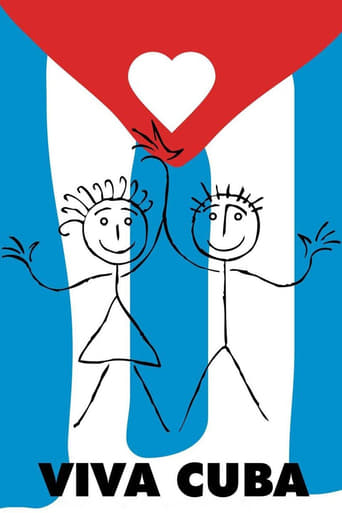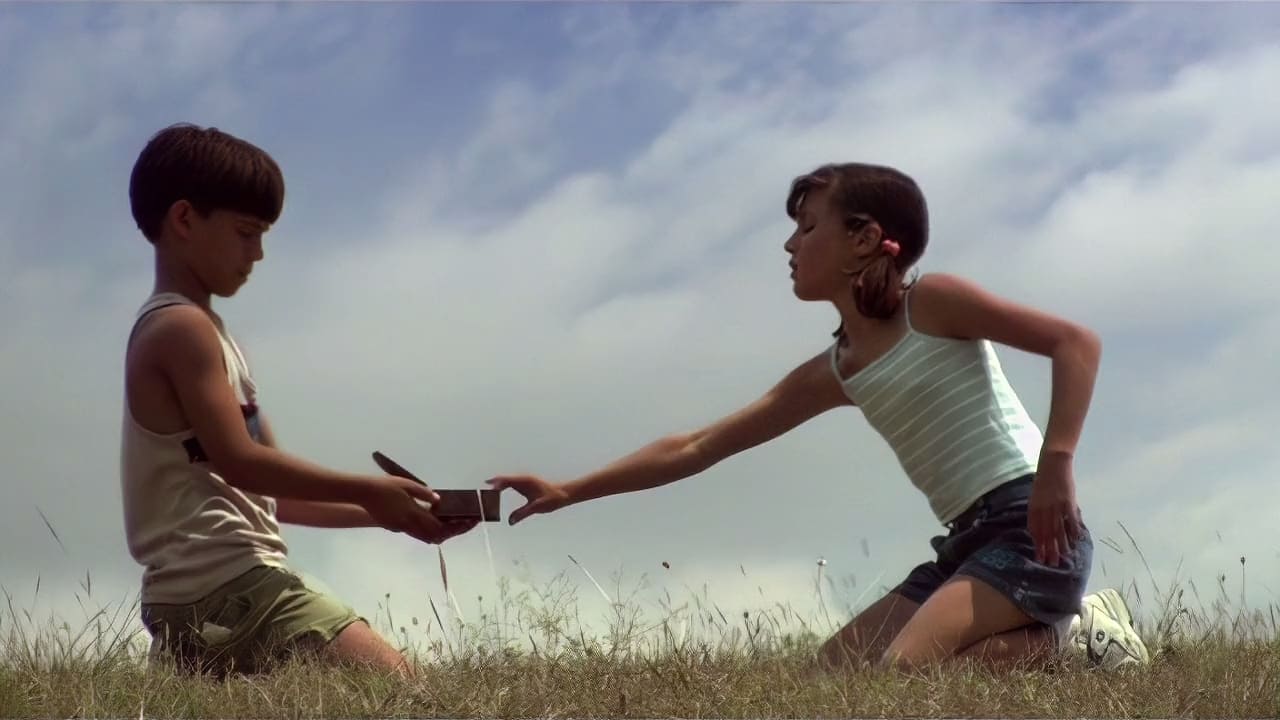d_in_chi
By title, and by the knowledge of where this movie was produced, many who watch movies might be turned off, or suspect of the film's quality at best. The first Cuban film I've seen, I went in with expectations that were shattered by a, dare I say, cute and heartwarming tale of friendship and the human spirit. I know that people are people no matter where they live, and a liberal at heart. Even for me, this is the last place I would have expected to look for such a story, and one of the last things I would expect to result in a few tears.Immediately, the story disarms us of political prejudice, with a scene of boys, including Jorgito, one of two protagonists, playing the Cuban version of Cowboys and Indians in the street. They happen upon a girl of the same age, Malu, and we see Jorgito and Malu having the first of their several arguments, those reminiscent of old married couples. Malu wants to play Queen of Spain to which Jorgito objects, setting up the dichotomous relationship we learn of with their families, and I would assume countless more in Cuba.Jorgito's and Malu's relationship is shown developing throughout the first act, something between childish/flirty teasing and puppy love. Antagonism is introduced when Malu's mother plans to marry and leave the country, resulting in one of the most touching scenes in any movie, let alone one for children, with both children sitting on a roof overlooking Havana, discussing the situation. By the time we see Malu turning, unseen, to face Jorgito, borders are nonexistent. Friendship is the great equalizer. I was Jorgito and have always been.The two run away and set out on a journey from Havana to southeast Cuba, to find Malu's father and prevent him from signing the paperwork that would allow Malu to leave Cuba. The scenes comparing/contrasting their lifestyles and routines in packing and in preparing "for school" that morning are the funniest part of the film, which isn't short on good laughs throughout.The emotion invoked by "Viva Cuba" and the universality of feeling expressed in the dialog ("When I grow up I want to be in charge; to do what I want." and "If I were in charge I would let kids do what they want.") within the story's context is tactfully darling. In terms of story, "Viva Cuba" stands up to American children's films about friendship, such as "Up" and "Wall-E," even more true and raw from the protagonists' perspective (quite literally, as the camera angles are set low and we are presented with a few glimpses into their imaginations), as this film almost completely eschews the realities of the adult/real world until they come crashing (lightly) down at the ending with the friends' bond unaffected.The movie takes you through Cuba, but does not make you feel like you or the characters are under an iron thumb or not free. It doesn't promote or glorify the country either. With a rare backdrop, it presents a personal struggle against confinements and misfortunes that are commonly experienced the world over.
cricket crockett
. . . which I saw as part of a film festival double feature following VIVA CUBA! These films are similar in that they are both about two 12-year-olds who feel misunderstood or neglected in their home situations, sense the stirrings of first love for each other, and decide to take a road trip across the island on which they reside. What the young people pack for their respective trips is one of the highlights of both of these movies. Among the differences of the flicks is the musical score. CUBA features upbeat Spanish pop songs, while MOONRISE is backed by dramatic English classical music. While MOONRISE is a big-budget picture featuring a cast of Bruce Willis, Frances McDormand, Bill Murray, etc., CUBA plays out with community-theater types probably working for food. MOONRISE's CGI is mostly missing in CUBA; the latter's ambiguous close with the kids disappearing in a crashing ocean wave might have been fixable if the director had had access to CGI resources adequate to make his actual intentions for the ending of his travel saga clear to his viewing audience.
Chirag Thakkar
"Pioneers of Communism, we shall be like Che." set in the land of Cuba, this story is subtly talking about living in the land of comrades and amidst this culture of communism is a story that Juan Carlos Cremata Malberti and Iraida Malberti Cabrera want to tell you. A story of unadulterated friendship and an unspoken language of love. That which can only be experienced and that discomforts you to rationalize it or put it into words. A story of Malu and Jorgito that like to defeat Spain in every war-game, that like to dance together and gaze at the sun, who like dogs and cats fight and argue over everything - but are equally addicted to each other for reasons they do not know and need to know. These "pioneers of exploration", set out on mission not knowing how far their destination is or how to make it there. Least bothered about the differences their parents and families share, these two are free from fear. fear of the unknown, fear of defeat for they know nothing can stop them as long as they are together. And this journey doesn't end in what they had desired it to be. But there's contentment in a the tragic choice they make. They choose not to succumb to irrational and insensitive boundaries that adults set for themselves and for these kids."It's better to die fighting for freedom than to live a life in chains" the kids manifest this into reality
Chad Shiira
As Jorgito(Jorge Milo) and Malu(Malu Tarrau Broche) sit on a rooftop and contemplate the young girl's impending departure from Cuba, the camera moves. One-hundred-eighty degrees later, the camera rests on the backs of their heads. We're looking with them, from their point-of-view, towards an uncertain future(for Malu, a faraway land across the ocean); not at them, in which we laugh condescendingly about the melodramatic proclamations that young people make about being inseparable. They'll survive the break-up. We know that. Some of us went through the same ordeal ourselves at that tender age. The camera moves as a way of representing the past and the future. But after the tears stop flowing, with the camera at repose, Malu's head turns towards Jorgito and asks him to run away with her. This gesture, this hatched plan of Malu's, places them in the present. Right here, right now, these close friends decide that they won't be split up without a fight.No matter how hard the school and the children's parents try to instill their political views upon Jorgito and Malu, politics never comes close to tearing them apart. This is best exemplified when the movie irises in on the boy and girl as they walk home from school, taking them out of context, out of Cuba, and into a world where only they exist; a world in which they are equals. As actual denizens of Cuba, however, Jorgito and Malu aren't equals(the boy is proletarian; the girl is bourgeoisie). "Viva Cuba" demonstrates this Havana reality at the outset when Jorgito is on his knees while Malu towers over him. But then Jorgito stands up so he's facing his friend, but still, in spite of the children's apolitical relationship, Malu remains taller(a reminder of their economical disparity). Malu wants to be the Queen of Spain, an absolute monarch, but because the girl comes off as disarmingly sweet and unpretentious, you give her the benefit of the doubt. She's just bossy; not a demagogue. "Viva Cuba" is a terrific rite-of-passage film that beautifully captures a passionate friendship of platonic love between opposite sexes which could only exist without the base culture of the west hastening their advancement towards a pre-pubescent sexual attraction. CGI effects service the genre of magic realism, not science-fiction this time, and the results are breathtaking. But "Viva Cuba" would be nothing without its outstanding performances by Jorge Milo and Malu Tarrau Broche, who in the best tradition of neo-realism, are natural and never less-than-real.


 AD
AD

